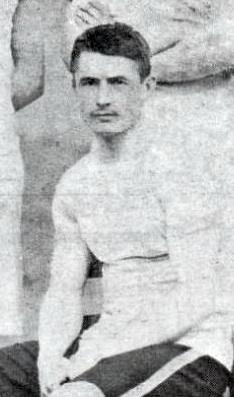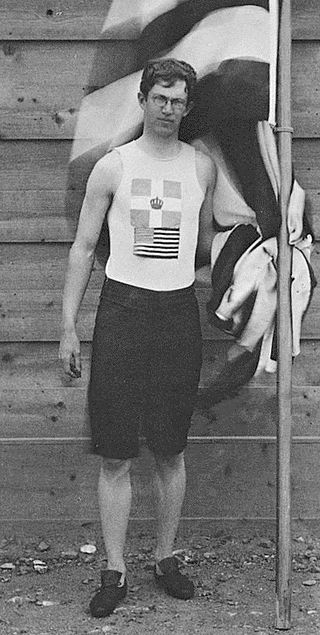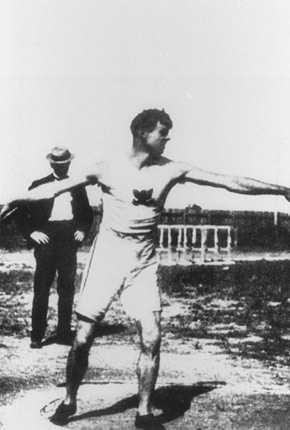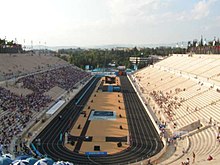
The Summer Olympic Games, also known as the Games of the Olympiad, and often referred to as the Summer Olympics, is a major international multi-sport event normally held once every four years. The inaugural Games took place in 1896 in Athens, Greece, and the most recent Games were held in 2021 in Tokyo, Japan. The International Olympic Committee (IOC) is responsible for organising the Games and for overseeing the host city's preparations. The tradition of awarding medals began in 1904; in each Olympic event, gold medals are awarded for first place, silver medals for second place, and bronze medals for third place. The Winter Olympic Games were created out of the success of the Summer Olympic Games, which are regarded as the largest and most prestigious multi-sport international event in the world.

The 1896 Summer Olympics, officially known as the Games of the I Olympiad and commonly known as Athens 1896, was the first international Olympic Games held in modern history. Organised by the International Olympic Committee (IOC), which had been created by French aristocrat Pierre de Coubertin, it was held in Athens, Greece, from 6 to 15 April 1896.
The 1906 Intercalated Games or 1906 Olympic Games was an international multi-sport event that was celebrated in Athens, Greece. They were at the time considered to be Olympic Games and were referred to as the "Second International Olympic Games in Athens" by the International Olympic Committee. However, the medals that were distributed to the participants during these games are not officially recognised by the Olympic Committee and are not displayed with the collection of Olympic medals at the Olympic Museum in Lausanne, Switzerland.

Robert S. Garrett was an American athlete, as well as investment banker and philanthropist in Baltimore, Maryland and financier of several important archeological excavations. Garrett was the first modern Olympic champion in discus throw as well as shot put.
At the 1900 Summer Olympics, twenty-three athletics events were contested. Altogether, 117 athletes from 15 nations competed. A total of 68 medals were awarded. In many countries, due in part to the conflation of the Olympic Games and the World's Fair in Paris, the media discussed only the athletics events under the "Olympic" name while ignoring the incredible variety of other sports featured at the time.

Spyridon Louis, commonly known as Spyros Louis, was a Greek water carrier who won the first modern-day Olympic marathon at the 1896 Summer Olympics. Following his victory, he was celebrated as a national hero.

The Men's marathon at the 2004 Summer Olympics took place on August 29 in the streets of Athens, Greece. One hundred and one athletes from 59 nations competed. The event was won by Stefano Baldini of Italy, the nation's first victory in the event since 1988 and second overall. The United States reached the podium in the event for the first time since 1976 with Meb Keflezighi's silver. Vanderlei de Lima took bronze, Brazil's first-ever medal in the men's marathon.

Adolphe Jules Grisel was a French athlete and gymnast. He competed at the 1896 Summer Olympics in Athens.

Panagiotis Paraskevopoulos was a Greek athlete. He competed at the 1896 Summer Olympics in Athens, and the 1900 Summer Olympics held in Paris. He was born in Gortynia and died in Corfu.

France competed at the 1896 Summer Olympics in Athens, Greece, from 6 to 15 April 1896. French athletes had appeared in every Summer Olympic Games of the modern era, alongside Australia, Great Britain, and Greece. France won the fourth-most gold medals with 5 and the fourth-most total medals with 11. Cycling was the sport in which the French competitors had the most success, as they completely dominated the field. The French team had 27 entries in 18 events, winning 11 medals.

Greece was the host nation of the 1896 Summer Olympics held in Athens. The number of Greek contestants is commonly cited as 169, but as many as 176 Greeks contested events in all nine sports. The Greeks were by far the most successful nation in terms of total medals with 47, 27 more than the United States of America. Nevertheless, their number of first-place finishes (10) was one fewer than the Americans' 11. The Greeks had 172 entries in 39 events. Only 4 events had no Greek entrants—the 400 metres and the high jump in athletics and the vault and the team horizontal bar in gymnastics.
Stamata Revithi was a Greek woman who ran the 40-kilometre marathon during the 1896 Summer Olympics. The Games excluded women from competition, but Revithi insisted that she be allowed to run. Revithi ran one day after the men had completed the official race, and although she finished the marathon in approximately 5 hours and 30 minutes and found witnesses to sign their names and verify the running time, she was not allowed to enter the Panathinaiko Stadium at the end of the race. She intended to present her documentation to the Hellenic Olympic Committee in the hopes that they would recognize her achievement, but it is not known whether she did so. No known record survives of Revithi's life after her run.

The men's marathon event was a special race invented as part of the Athletics at the 1896 Summer Olympics programme. Seventeen athletes from 5 nations competed. It was the capstone of the athletics programme. The event was won by Spyridon Louis and was the only Greek victory in athletics.

The men's long jump was one of four jumping events on the Athletics at the 1896 Summer Olympics programme. There were nine contestants in the long jump, held on 7 April. The American jumpers proved themselves dominant in taking the top three spots. The event was won by Ellery Harding Clark. Clark would later win the high jump as well, becoming the only man to win both the high jump and long jump in the Olympics.

The men's high jump was one of four jumping events on the Athletics at the 1896 Summer Olympics programme. The high jump was held on 10 April. Five competitors took part in the event, three of them Americans. Ellery Clark, who had previously won the long jump, also won this event. Garrett and Connolly tied for second place.

The men's pole vault was one of four jumping events on the Athletics at the 1896 Summer Olympics programme. Five athletes competed in the pole vault. The two Americans far outclassed the three Greeks, starting higher than the Greeks could clear and taking first and second places. Damaskos and Theodoropoulos tied for third, while Xydas took fifth.
The men's shot put was one of two throwing events on the Athletics at the 1896 Summer Olympics programme. Seven athletes took part in the shot put competition on 7 April. The two Greek athletes both won medals, with Gouskos battling closely with Garrett of the United States for the longest distance.

The men's discus throw was one of two throwing events on the Athletics at the 1896 Summer Olympics programme. The discus throw was the fourth event held. It was contested on 6 April. 9 athletes competed, including one each from France, Sweden, the United States, and Great Britain as well as three Greeks and two Danes.

The men's discus throw was a track and field athletics event held as part of the Athletics at the 1904 Summer Olympics programme. It was the third time the event was held. The competition was held on Saturday, September 3, 1904. Six athletes from two nations competed.
The First Olympics: Athens 1896 is a 1984 American television miniseries produced by Columbia Pictures Television for broadcast by the NBC network. This television miniseries tells the story of the founding of the modern Olympics by focusing on individuals in several countries and their preparations and eventual competition in Athens in 1896. The two-part mini-series originally aired in the United States on May 20, 1984.














